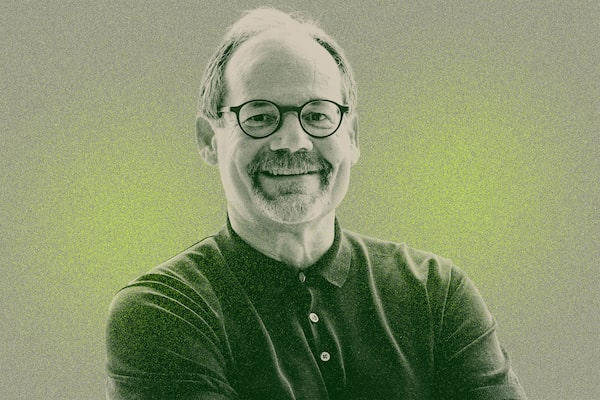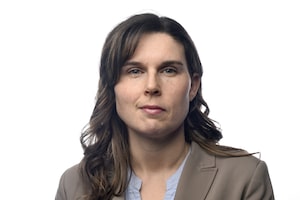
Michael DowneyPhoto illustration The Globe and Mail. Source photo Jeff Chevrier/The Globe and Mail/The Globe and Mail
After 15 years as Tennis Canada’s president and chief executive officer, Michael Downey is retiring this month from his dream job.
He has filled the position twice since 2004, lured away for a few years to be CEO of the Lawn Tennis Association of Britiain, the national governing body of the sport. He also conquered cancer along the way. Before all that, he had an accomplished career with well-known Canadian companies such as Molson and MLSE. Asked what makes him proudest of his time with Tennis Canada, he says “the renaissance of Canadian high-performance tennis, and it took a village.” He recalled the big moments, such as titles for Canada’s Billie Jean King Cup and Davis Cup teams, Wimbledon finals for Milos Raonic and Genie Bouchard, Bianca Andreescu’s U.S. Open victory and the final for Leylah Annie Fernandez in New York.
“I just felt as I’m heading towards 67, it was time for me not to be leading an organization anymore,” Downey said this week. “But I’ll do contract work and volunteer work. I need purpose.”
What was the best day on the job?
The best day was actually when I was CEO of the LTA, sitting in the Royal Box [at Wimbledon] watching Milos in the semi-final versus Roger Federer in 2016. Cheering isn’t really allowed in the Royal Box, but I was cheering. Someone I knew seated behind me took a picture of me with my arm in the air when Milos served his last ace to win. The crowd was all for Federer, but Milos won and advanced to his first Grand Slam final. Then I was invited back to the Royal Box for the final and someone came up to me – I won’t say who – to remind me who I’m cheering for, because Milos was playing [British star] Andy Murray. I remember saying ‘I know who butters my bread.’ Even though Milos lost the final, the players walk up after the match and those in the Royal Box stand at the top of the stairs, so I got to hug Milos before anyone else, and I said ‘I’m so proud of you.’ I got to watch the highest-ranked Canadian singles player ever win a semi-final over a legend and make his first final. Milos has since autographed that photo for me.
I also had the pleasure of being in New York when Bianca won the U.S. Open in 2019. To think that this 19-year-old could beat a seasoned player in Serena Williams on her home court in New York when she was going for No. 24 [Grand Slam wins] in front of 24,000 people. Bianca’s composure was remarkable. That day was special as well.
What was the hardest day on the job?
It was during COVID when [Tennis Canada] had to lay off 40 per cent of our staff. We were hemorrhaging. We are a unique national governing body where we make 90 to 95 per cent of our own money, and we lost both tournaments, and we were headed towards a $17-million loss. We had no choice but to terminate the services of 50 people. That was difficult, because we pulled the heart out of the organization, but you’ve got to make sure the business can survive. We had no choice.
What things are you leaving unfinished?
A lot. It’s never ending when you’re trying to grow a sport. We are still extremely underdeveloped per capita in year-round courts. We’re one of the worst-performing tennis countries in the world in that area. Our year-round court-for-population [ratio] is like 1 to 50,000 people, while in most of Europe, it’s 1 to 10,000 or 15,000. That’s an area where we need to keep working. It means that kid that aspires to be a world champion can train year-round. It also creates more jobs in coaching and facility management.
When and where were you happiest?
I’m a workaholic. I’m not proud of it, but I’m happiest at the office. I love leading and seeing other people develop under my leadership and under other people’s leadership. So while obviously family’s really important, I think my sanctuary has been work. I have to say that to be truthful.
What’s your greatest fear?
Failure. I think most workaholics must have some level of fear of failure, because why would you work so hard? Whether I know it consciously or unconsciously, I have a fear of letting people down, and that’s probably been a driving force behind why I work so hard.
What is your greatest regret?
Being a workaholic, I was absent from a lot of my kids’ formative years. I can’t get that time back with Sam and Mac, but I can dedicate more of my retirement to help steer them, and Schara, who came into my life later, through life’s challenges. My youngest, Sam, is on a rewarding journey being non-binary trans. We laugh as I learn to migrate they/them pronouns. Sam keeps telling me there is two of them – so just think plural! I’m proud of Mac for successfully launching the first annual Toronto International Music Video Festival last month. He is quite an entrepreneur!
Any authors or books that have resonated with you?
Mitch Albom, the American journalist. I’ve read nearly all his books. I got to appreciate his work first through his column in the Detroit Free Press. His books are so inspirational. In one book, Finding Chika, he went to Haiti and adopted an orphaned girl, and she unfortunately died of brain cancer and he writes about that. I also love that he gives back so generously. He also does a radiothon in Detroit and it raised US$2-million [for Detroiters in need].
What’s your most treasured possession?
I spent a lot of time in my teenage years tracing the Downey family tree all the way back to Ireland. So I have copious notes – like my grammar and writing were poor – but I have more knowledge of my family than anyone else in the family. When I was a teenager, I had some very elderly grandparents and aunts and I interviewed them. So I have a case of articles, clippings, notes from my family tree. My father and my grandfather didn’t know that my grandfather’s grandfather was buried at St. Michael’s Cemetery [in midtown Toronto] and I took them to see the stone. They were in shock that I had found this as a 14-year-old. When I’m passionate about something, I will go to all lengths. And I’ve kept all that information for my kids or whomever.
What do you consider your greatest achievement?
How I was resilient through cancer. I was diagnosed with two cancers by two different specialists on the same day, had chemo and radiation within two weeks all through the fall of 2008, then a surgery prior to Christmas. I had a seizure, lost my driver’s licence, had a catheter for nine months, a temporary bag for nine months, and a septic infection where I was in ICU for four days. I recall a nurse in the ICU saying to me, ‘we don’t normally see people watching tennis while in ICU,’ but I was watching Roland Garros. My wife and kids were there for me. It showed how resilient I can be, and how vulnerable, too. I sent out what I called chapters. I would write a page about how I did with chemo that day, what I struggled with, and sent it out to like 100 friends and colleagues. People came back with well wishes but also said ‘I didn’t know that about chemo, I’d been scared to ask those questions.’ Those were nine tough months in my life. The cancer experience changed me for the better. Even though I’m still a workaholic, I think I smelled the roses a little bit more after that.
What is a trait that you deplore in others?
A lack of passion, so I’m really talking about colleagues at work. I want to know they’re skilled, and good at what they do and committed, but I love to see passion in people and if I don’t see it, it’s tough for me to accept that.
What’s a trait you deplore in yourself?
I can be impatient. I’ve had to say to myself, ‘just because you’re working at 11 p.m. or 6 a.m., be patient here because other people are more balanced in their lives, and quite frankly, that’s how they should be.’
I remember in an interview with you over a decade ago, you told me ‘I don’t play tennis, but I have phenomenal passion for it, and I love to go out and talk about it.’ Has any of that changed?
No. I still have great passion for it. I recall sitting with a board member watching a tennis match and I started critiquing the play, and that chair said, ‘you actually don’t know what you’re talking about.’ But I’m very passionate about the sport and the Canadian players. I’ve loved getting to know them as people. I came in early this morning in Montreal and talked to Jorge Fernandez and saw Leylah and Bianca training. I love the journey these players take and the committed family and coaches around them.
Are you going to miss that?
You know, I reached out to Bianca the other day and said ‘is it okay if I keep sending you notes after your victories?’ and she said, ‘absolutely.’ And my relationship with Milos is very special – I’ve known him since he was 16. He is so thoughtful in helping us out in everything we do. I know we’ll stay in touch.
 Rachel Brady
Rachel Brady